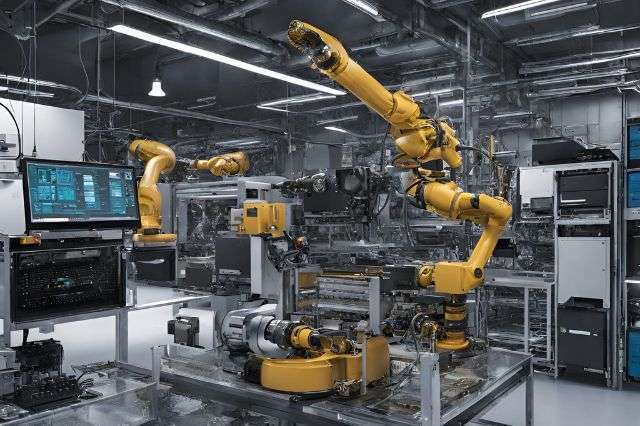Optimizing Operational Efficiency: The Role of Advanced Computing in Industrial Automation
The quest for improved operational efficiency is ceaseless. As markets grow more competitive and margins tighter, manufacturers and industrial operators are turning to advanced computing solutions to streamline processes and increase productivity. Industrial automation, driven by significant technological advancements, stands at the forefront of this revolution, transforming the way factories and plants operate. By integrating sophisticated computing technologies, industries can achieve higher levels of automation, precision, and efficiency.
Understanding the Impact of Advanced Computing
Advanced computing technologies such as Panel PCs, PLCs (Programmable Logic Controllers), custom control panels, and SCADA (Supervisory Control and Data Acquisition) systems are pivotal in industrial automation. These technologies enable businesses to automate complex manufacturing processes, monitor and control production lines remotely, and make data-driven decisions that enhance operational effectiveness.
The integration of advanced computing in industrial environments is not just about replacing human labor with machines but rather enhancing the capabilities of human operators. With real-time data at their fingertips, operators can quickly identify and rectify production bottlenecks, predict maintenance needs, and ensure consistent product quality. This shift towards a more data-centric approach in manufacturing requires reliable and robust computing solutions.
Leveraging Technology for Enhanced Industrial Automation
In industrial automation, technology plays a pivotal role in ensuring that production processes are efficient and adaptable to varying industrial conditions. Among the technologies making a significant impact are panel PCs, which are crucial for managing the complex automation tasks that modern industries demand.
These specialized computers are engineered to endure the harsh conditions typical in industrial settings, such as extreme temperatures, vibrations, and exposure to dust. Their rugged builds and touch-screen interfaces allow for continuous operation and easy interaction, even in the most demanding environments. Panel PCs are not merely tools for automation; they are central to the reliability and effectiveness of automation systems, providing the robust computing power needed to handle large volumes of data and complex tasks efficiently.
This integration of durable, high-performance computing solutions like panel PCs into industrial automation systems is essential for maintaining seamless production workflows and achieving operational excellence. The capability to operate reliably under challenging conditions makes these devices invaluable for industries that rely on precision and durability to maintain high productivity levels.
Enhancing Operational Efficiency with AI and Machine Learning
The adoption of AI and machine learning technologies in industrial automation is transforming operational efficiency. These technologies enable predictive maintenance, quality control, and even adaptive manufacturing processes. By analyzing data collected from various sensors and machines, AI algorithms can predict when a machine is likely to fail or identify quality issues before they become costly problems.
Machine learning models can also optimize production processes by continuously learning and adapting to new data, thereby improving efficiency and reducing waste. This adaptive capability is particularly beneficial in industries where product specifications or raw materials vary frequently, allowing for real-time adjustments that maintain output quality and consistency.
Overcoming Challenges in Advanced Computing Adoption
While the benefits of integrating advanced computing in industrial automation are clear, several challenges need addressing to realize these benefits fully. These include:
- Technical Complexity: Implementing sophisticated automation systems requires a high level of technical expertise. Companies must invest in training and development to equip their workforce with the necessary skills.
- Cybersecurity Risks: Increased connectivity and reliance on data-centric technologies expose industrial systems to cybersecurity risks. Protecting sensitive data and ensuring system integrity is paramount.
- High Initial Costs: The upfront cost of implementing advanced computing solutions can be significant. However, the long-term savings and efficiency gains often justify this initial investment.
Future Trends in Industrial Automation
The integration of Internet of Things (IoT) devices and the expansion of edge computing are set to revolutionize industrial automation further. These technologies will enhance the systems’ capability to process and analyze data at the source, reducing latency and increasing responsiveness. As these technologies mature, their integration into industrial automation will become more streamlined, leading to smarter, more efficient, and more sustainable industrial practices.
Charting the Course for Future Industrial Efficiencies
As we look toward the future of industry, it is evident that the integration of advanced computing technologies will be a cornerstone in defining the next era of industrial automation. These technologies, ranging from AI and machine learning to robust panel PCs, are not just enhancements but fundamental to achieving new levels of efficiency, sustainability, and adaptability in manufacturing processes. This evolution represents more than just technological adoption—it marks a strategic transformation towards smarter, more responsive industrial environments capable of facing modern challenges head-on.
The move towards a digitally enhanced industrial future is both an opportunity and a necessity for businesses aiming to thrive in an increasingly competitive landscape. As industries adapt to this digital transformation, they are setting new benchmarks for operational excellence and innovation. The journey is undoubtedly complex, involving significant investment in both technology and skills, but it is also immensely rewarding. By embracing these advanced computing solutions, industries can look forward to enhanced operational efficiency and a significant contribution to environmental sustainability and economic stability.





